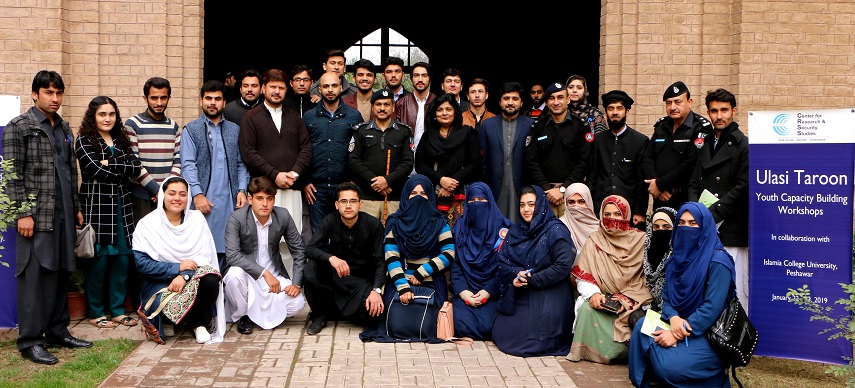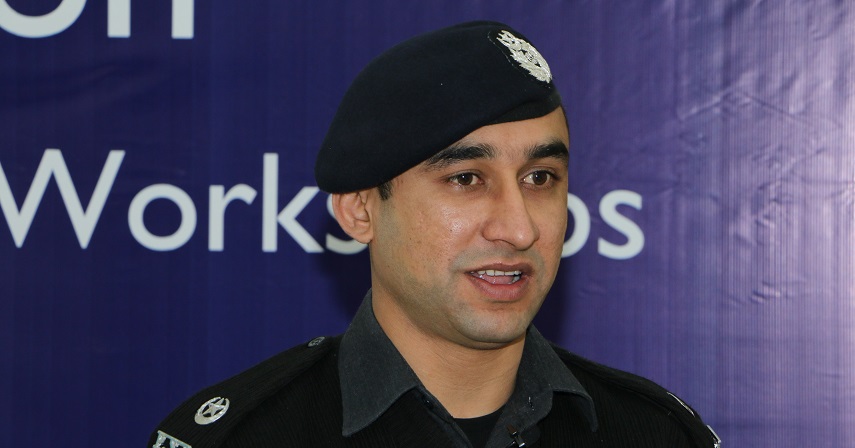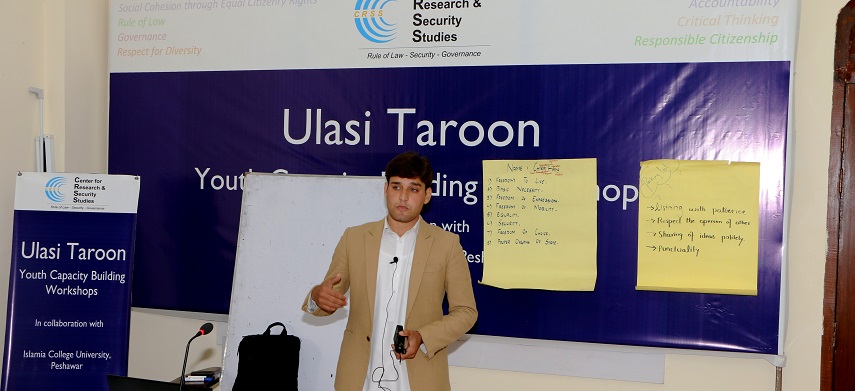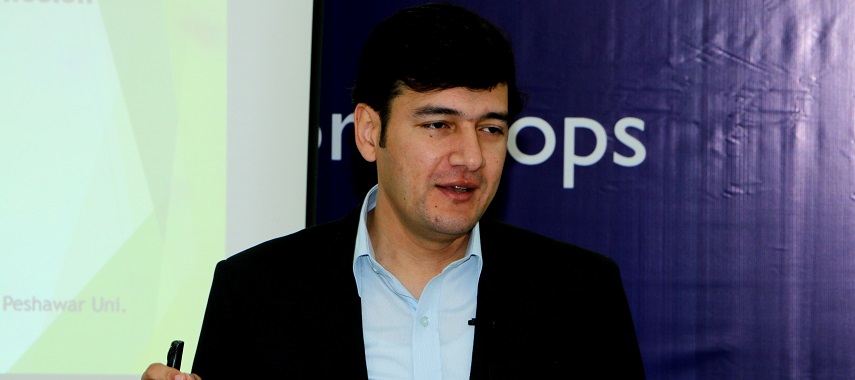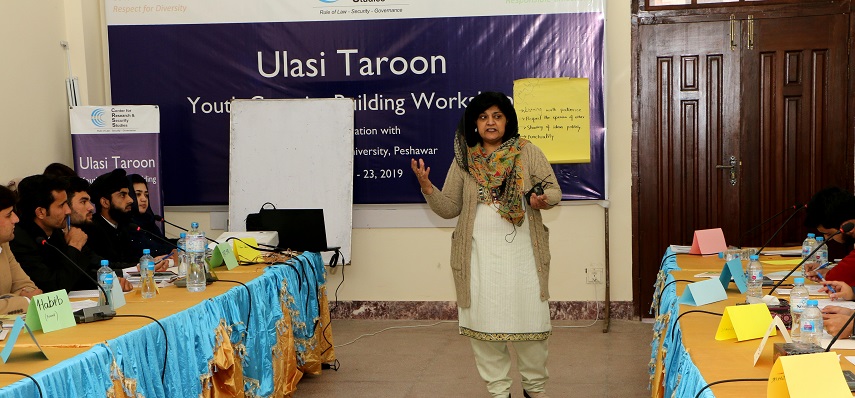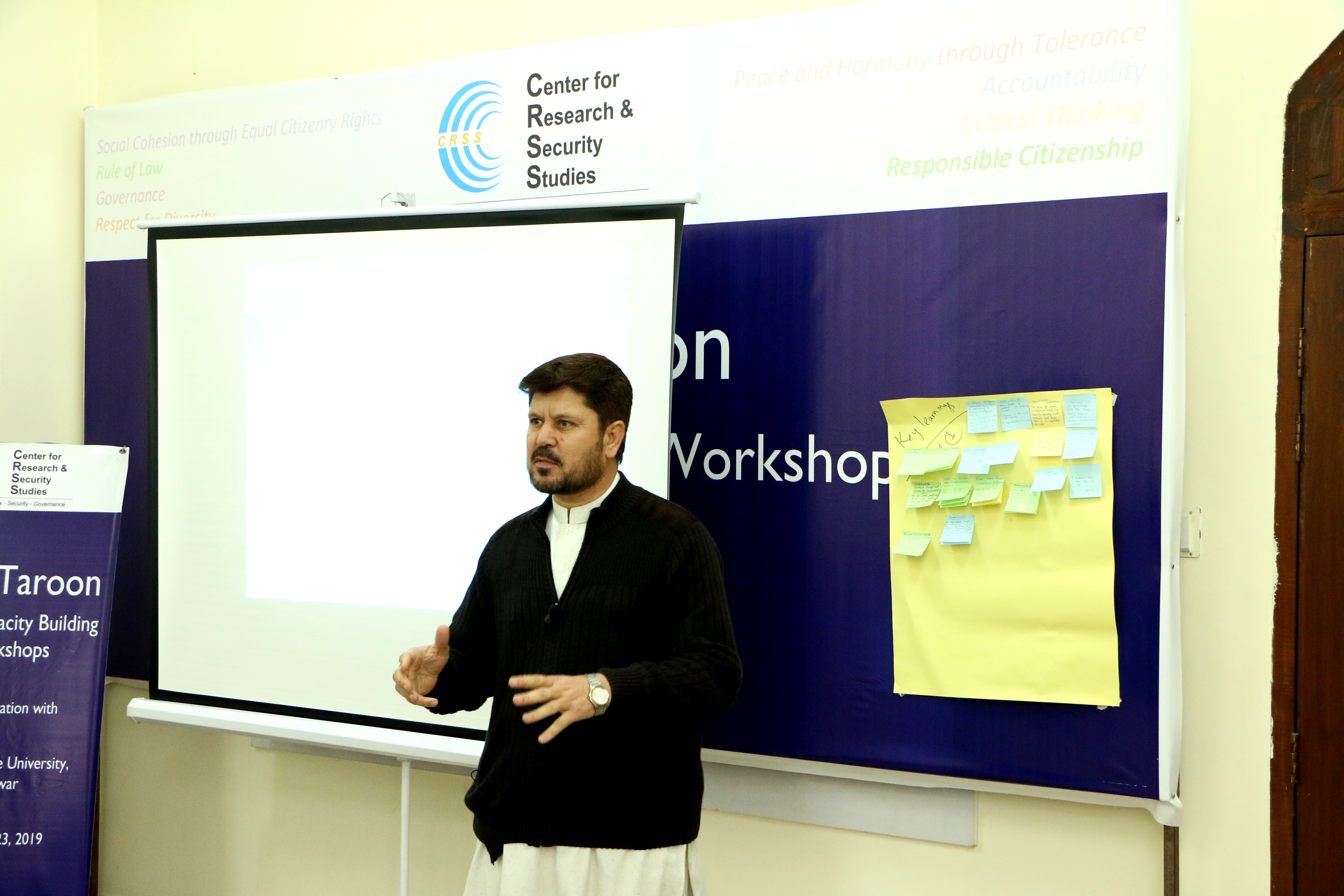Regardless of our social, political or economic statuses, we must all be subject to and submit before law to ensure everyone’s equality before the law. The social cohesion follows immediately when we believe in the rule of law and certainty of punishment. The fault lines of the society such as deviation from constitution and giving up on rule of law and fundamental human rights can make the deviants ever more vulnerable to the push and pull factors of radicalization, besides causing a massive disintegration and destruction to the social fabric and cohesion. These fault lines were manifest in the incidents that took place in Swat before the military operation to uproot terrorism.
These were the remarks made by the Capital City Police Officer (CCPO), Peshawar, Mr. Qazi Jamil during the fourteenth round of Ulasi Taroon, Youth Capacity Building Workshops organized by the Center for Research and Security Studies (CRSS) in collaboration with the Islamia College University, Peshawar from January 22-23, 2019.
He said that the stories of our heroes who went above and beyond the call of their duties and displayed exceptional courage and commitment to uphold rule of law are worth remembering and disseminating to underline the precious value and cost of rule of law in the country. This is hoped to inspire the citizens to commit to and promote rule of law. People may hold views and grievances against the government and state institutions for misperformance and delivery failure but it should never ever translate to violence and rebellion. The youth has a crucial role in this regard; they should study and research and make positive interventions accordingly – through peace advocacy. We may have disagreements but social cohesion demands shared goals, common objectives and concerted efforts with the inclusive role of people from all segments of the society. The mutual trust and social capital is not only the prerequisite for social cohesion but also for the rule of law. The coercive measures may not always be the best option to uphold rule of law and foster accountability.
Mr. Wasim Riaz, Superintendent of Police, Peshawar Cantt. noted that the rules and regulations that regulate human relations – through penalties for violations – in the country are called laws. The concept of rule of law calls for compliance with these laws and regulations to uphold the sanctity of constitution. The coercive measures should not be the answer to ameliorate the issues facing the society. The objective evaluation of the causes of a problem – with empathetic approach at the core – is direly needed as core consideration to uphold rule of law.
One of the fundamental parameters to gauge the quality of and uphold rule of law is across the board accountability of indiscriminate nature. The important consideration to strengthen rule of law in the society is to strengthen the accountability mechanisms and ensure equal application of law on everyone regardless of socio-political or economic backgrounds. In this regard, the de-politicization of the accountability processes is of paramount importance.
The application of accountability should not only be for the violation of laws and crimes committed but also for criminal negligence committed. The selective application of law is extremely detrimental to peace and potential to disintegration. Those at helm of the implementation of laws should be extremely responsible and vigilant as the powers come with great responsibilities. There is a very critical linkage between laws and rule of law; the better the law, the stronger the rule of law. The dispute resolution mechanism – including the alternate dispute resolution systems in place – is another crucial tool to ensure accessible justice.
Mr. Yasir Hayat from FATA Secretariat said that democracy means power with people including the decision making where it has to be representative and work in the best interest of the people. True democracy is the one which reflects the wishes, desires and values of the people it represents. However, it does not mean that the majorities can injure and overlook the minorities’ concerns. The concept dictates that no one is above the law including the rulers. It calls for the politically aware and active citizens and accountable rulers. Democratic awareness should not only be for the citizens but also important for their representatives to improve their service delivery. Democracy is an inclusive system which provides social protection and opportunities for equal participation to the vulnerable groups in the society. Besides all the other fundamental rights anchored in the democratic system of governance, the right to meaningful life is equally important to ensure citizens’ social inclusion and mobility. While it is important to have robust accountability mechanisms in place within the state, an equal onus is on the citizens to mobilize a meaningful pressure to hold their representatives and government officials accountable.
Dr. Tauqir Alam, Registrar, Islamia College University, Peshawar appreciated the CRSS’s workshop on social cohesion. He said that the students direly need such opportunities where they can participate, interact, network and channelize their talents and energies into a production discourse. Only by participation in such workshops, can they serve the nation as future leaders; promoting the messages of love, peace and harmony.
Mrs. Shagufta Khalique, educationist underscored the importance of educating public on the rights and responsibilities anchored in their constitution as well as the international commitments like UDHR. The role of youth in promoting these ideals of equality and tolerance is direly needed. Once the diversity and differences are accepted in a society, the ultimate result is peace. Democracy is also an attitude that needs to be inculcated among youth with practical examples. We must understand that dialogue is the key to resolve the disputes and differences rather than force or coercive means.
Mr. Shams Momand, Project Manager, CRSS spoke about the role of media including broadcast, print and social media to counter radicalization and disseminate the positive messages and tolerance perspectives. It has tremendous outreach key to cultivate the public in the cohesive values. The youth should positively use this platform to spread the messages of peace and harmony.
Mr. Malik Mustafa, Manager Programs, CRSS underscored that the key to social cohesion lies in abiding by the core constitutional values of peace, respect and coexistence enshrined in the constitution. The gratitude and optimism are the virtues that can not only nurture happiness but can also change the way the youth can pursue their visions and achieve success.
Ulasi Taroon is a counter radicalization initiative of CRSS that aims to address the radicalization challenges, extremist ideologies and foster social cohesion through a discourse anchored in the core constitutional values which are fundamentally essential prerequisites for social peace and harmony. The endeavor aims to cultivate and sensitize the youth – in the universities across KP – in the core values in the Pakistani constitution and our social contract. It’s an attempt to highlight the criticality of abiding by these ideals – such as adherence to rule of law, primacy and sanctity of constitution, equal citizenry, responsible citizenship, respect for fundamental human rights, tolerance for diversity and different opinions, inclusive democracy and good governance – as a measure of fostering social cohesion and peaceful co-existence.

